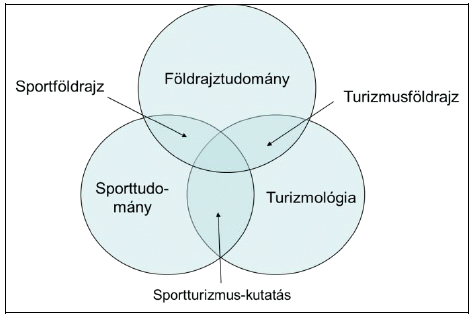III.6. Sport tourism research
Before the 1990s sport was discussed by researchers only in very general terms and in fragmentary contexts. The role of sport science was negligible even in the organization of major sport events, like the Olympic Games. The situation was the same in relation to sport recreational and health- and fitness related activities. (Hinch and Higham 2001).
The academic research into tourism as well as sport science has a common area, that is sport tourism research. It investigates sport in its role as primary tourist attraction, so it can be viewed as a new multidisciplinary research area. Sport science integrates certain areas of science and social studies, and it has its own research problems, study areas, terminology and methodology. (Frenkl 2003). Its research topics include the phenomena of body culture and it also focuses on the persons, who are engaged in some body-culture-related activity Since humans, who are engaged in some sport, are investigated from a variety of aspects, sport science has several subsidiary branches, including sport physiology, sport psychology and sport history.
Tourism, due to its complexity, can also be investigated from different points of view. This is why tourism research is also very complex and it includes destination research, the study of larger or smaller regions and settlements, the processes of planning, tourism development, image building, needs analysis and many other research areas. (Aubert ed. 2007). It is primarily the disciplines of economics, sociology, and geography which can be related to the research of tourism, as an independent academic discipline. (Aubert 2005). Most recently it is also called ’tourismology’. (Michalkó 2012).
The identification of the exact place taxonomy of sport tourism research is not an easy task, considering the fact, that it used to develop within the framework of geography, examining the mutual relationship between natural and social environments and their spatial structures. But, if it is considered on its own with the aim of creating a model, a new opportunity arises to define the place taxonomy of tourism research. (Figure 2).

Figure 2: The relationship between geography, sport science and tourism science (tourismology) Designed by the author.
Sport geography, geography, tourism geography, tourismology, sport tourism research, sport sscience.